#metafiction
Text
Tim: So, and for what reason was I 17 years old for the last 15 years?
Damian: That's what you're complaining about? They couldn't even bother to give me a proper characterization until much later on. And then it is one that does not align with my upbringing!
Stephanie: At least you weren't killed just because of misogyny
Dick: Yeah, I wonder how anyone let that through. But then again, I shouldn't expect anything else from writers who made me stuck as Ric for two years and all the, you know, Tarantula stuff
Jason: It's honestly like they just spin a wheel every day to figure out if I'm a villain, hero or anti-hero
Duke: Forget about the writers, the fans also have some... wild assumptions
Stephanie: Yeah, like that you're the normal one!
Cass: Or that I'm mute. Just there to give emotional support
Barbara: Or that the most traumatic thing to ever happen to me is framed as something good just because I became Oracle. I barely had one page of dialogue in that entire story!
Tim: At least they get one thing right.
Dick: And that is?
Tim: Bruce.
Jason: Yeah, what is up with that?! It feels like I've become his punching bag! Why is he considered a hero again when he is just plain abusive at this point?
Duke: Patriarchy
Barbara: And male power fantasy
#meta#dc#dc comics#batman#batman comics#metafiction#tim drake#jason todd#dick grayson#damian wayne#damian al ghul#I could have talked more about other issues but if I'd do that I'd be sitting here until tomorrow#cassandra cain#stephanie brown#duke thomas#barbara gordon#robin#red robin#nightwing#dc signal#dc orphan#batgirl#dc spoiler#dc oracle#red hood#bruce wayne#batkids#batsiblings#batfam#batfamily
1K notes
·
View notes
Text
BURY YOUR GAYS has a whole dang bunch of 'media within media' meaning movies or television that only exists in a fictional timeline. so i have been thinking, what is your favorite metafiction way?
personally chuck has been watching sopranos and i really want to see CLEAVER
also preorder BURY YOUR GAYS for the the scoop on 'devil's due' and 'broken don'
297 notes
·
View notes
Text

Still can't find a working link for Goncharov (1973), but...
Creating Goncharov is live on Itch.io!

Everyone knows Goncharov. Martin Scorsese's 1973 film is a cult classic, a true masterpiece of cinema. To celebrate its upcoming 50th anniversary, you, an office drone working at a major media corporation, have to create a pitch for a 2023 remake. It's an amazing opportunity that could launch your career. There's just one problem.
You haven't seen Goncharov.
Unable to turn down your corporate overlords, you and an indecisive colleague throw together a story based solely on information you can quickly find or invent.
How will you reimagine the greatest mafia movie ever made and what will you do to turn your ideas into reality?

Creating Goncharov is a surreal interactive fiction game created for Autumn Chen's Goncharov game jam. This game was written and coded by Albie. For more games by Albie, click here.
Play it here!
CW: Unreality and brief descriptions of smoking, violence, and death
Featuring the song "Main Theme from Goncharov" by @caramiaaddio. Original poster by @beelzeebub. Game screenshots below the cut.
Check out the other games made for the game jam here.

Goncharov is a fake film. Read more on it here.

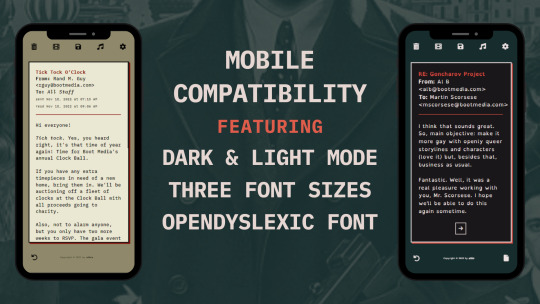
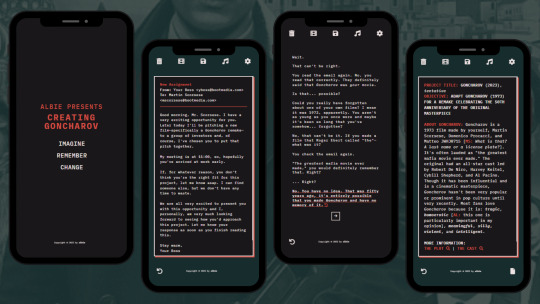
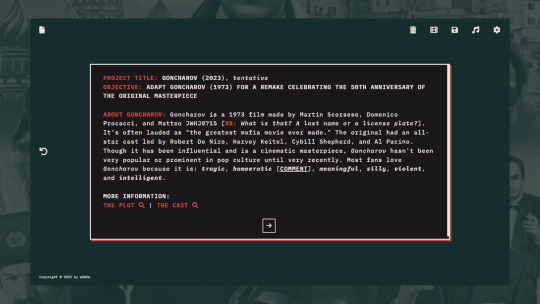
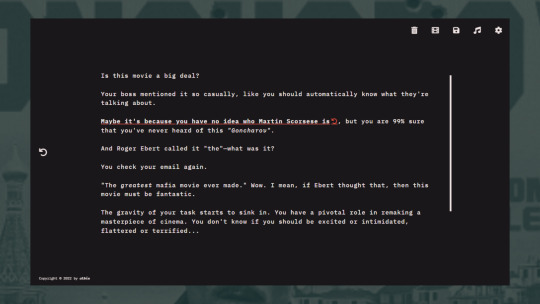

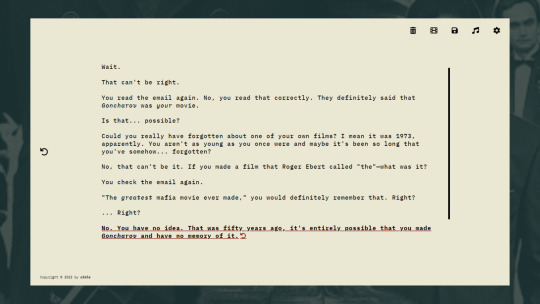

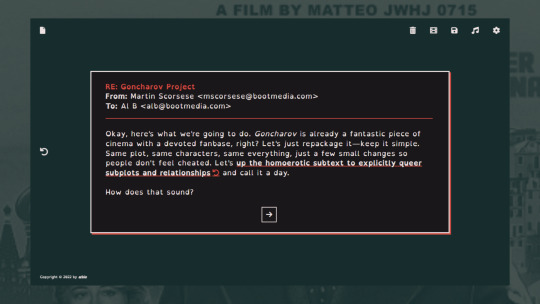

#goncharov#martin scorsese#interactive fiction#surreal#lgbtq#fanfic#indie game#game dev#goncharov 1973#twine game#game jam#comedy#goncharov game#metafiction#goncharov meta#creating goncharov#unreality#cw unreality
1K notes
·
View notes
Text
Worm and other media that won't just let you shoot the Joker, part 1:
Worm comments on the structure of stories, especially superhero stories, in some interesting ways. There's a lot of stuff that happen in superhero comics for no real reason than that it needs to happen for the story to be interesting; a huge amount of Worm's worldbuilding is devoted to taking these things and making the fact that they have to happen an explicit in-setting constraint. For instance, superhero stories tend to have more powerful heroes face off against much more powerful villains than their less-powerful allies, to the point where it seems like super-powerful threats are coming to earth every few weeks just because it wouldn't be interesting to read that comic otherwise. It gets weirder when you compare what villains end up visiting the cities of uber-powerful heroes vs the cities of less powerful heroes: Gotham mostly just has to deal with serial killers while Metropolis is a magnet for evil gods. Worm plays with this by having the Endbringers exist only because the big hero needed something to fight in-text: it changes "powerful heroes need powerful villains or else it wouldn't be interesting" from a Doylist justification to a Watsonian one. Then there's the fact that so much of the horrible conflict in Earth Bet is explicitly caused by Gods making sure the powers they grant people lead to increased conflict, the fact that one of the most powerful characters does what she does because the plot path to victory says she needs to, etc.
But the big one is Jack Slash, and how he's only able to get away with his bullshit because he has plot armor as a secondary power. As WB says here, "Jack's a reconstruction of the Joker type character in the sense that you can't have such a character take such a high profile position in the setting, without having there be a cheat." The Joker and similar characters are only able to keep being relevant threats in their stories because the narrative bends to let them win and stops them from being killed. Jack Slash is only able to keep being a relevant threat because his power makes the universe bend to let him win in the same way. Not only does this make for an interesting obstacle (its almost like they're fighting an authorial mandate!), but it skewers the use of similar character's plot armor and how unrealistic and unsatisfying it makes their stories.
But wait, what does it mean for a story to be "unrealistic" in the context of superpowers? Is being unrealistic in those contexts actually a problem? For that matter, what does it mean for a narrative to bend to let someone win? Its not like there's an objective way fighting the Joker would go, which the author is deviating from by letting him survive.
[Stuff under readbelow contains spoilers fo, the movie Funny Games and the book Anybody Home?]
Maybe we could say that if characters like the Joker were real, and put in the situations they are in their stories, they would end up being killed really quickly. But is that a reasonable way to judge stories? A narrative where such a character is killed unceremoniously to satisfy a need for realism isn't any less an expression of the author's deliberate choices than a story where the character keeps showing back up to satisfy a desire for fan-favorite characters. And while Jack Slash's arcs help show why deviating from "realistic consequences" in the service of keeping a character alive can make a story exhausting and screw with an audiences' appreciation of stakes, it doesn't make a strong case against the concept of villains having plot armor in general. A story isn't necessarily worse just for being constructed to keep the villains alive—all stories are constructed, and sometimes being constructed that way makes for the best story.
That becomes more clear when you take the premise of Jack Slash as "killer who wins because the mechanics of the universe says so" and make clear just how much "the mechanics of the universe" really just means "the story". Which is how you get Peter and Paul from Funny Games.
I'd highly recommend watching Funny Games (though for the love of god check content warnings), as well as Patricia Taxxon's review of it that I'm cribbing a lot from here. But to summarize, Funny Games is a movie written and directed by Michael Haneke about a family's lakeside vacation being interrupted by the appearance of two murderous young men, who capture them in their own house and slowly torture and kill them off. At least, that's what it seems to be about initially. It marketed itself as a somewhat standard entry in the genres of torture porn and home invasion thrillers, and played itself straight as one for the majority of its runtime. But then one of the two villains of the pair, "Paul," starts talking to the audience.
It starts small: after crippling the family's father and revealing that he killed their dog, Paul has the wife look for its corpse outside. While giving her hints, he slowly turns back towards the camera and smirks, before turning back. In isolation, maybe it could be interpreted as Paul smirking at Peter, seeming to look out at the audience only because of clumsy blocking. But then it happens again. Paul tells the family, who are completely at their mercy at this point, that they're gonna bet that they'll all be dead within twelve hours. When the family refuses to take the bet, asking how they could hope to win it when he can clearly off them all whenever they wish, Paul turns towards the audience and asks "what do you think? Do you think they stand a chance? Well you're on their side aren't you. Who you betting on, eh?" The audience is being acknowledged; their role as someone invested in the story is being examined by the ones introducing the stakes.
youtube
But the biggest moment comes near the end, when the mother grabs the shotgun she's being threatened with and blasts Peter. Paul startles, grins, and then hurredly grabs a tv remote and presses rewind. The movie itself suddenly rewinds to right before the mother grabs the gun, and plays again with Paul grabbing the shotgun right before the mother reaches for it.
Its a truly incredible moment, in that its the perfect way to forcibly take away the audience's suspension of disbelief. It forces the audience to acknowledge that they're viewing a story, not something happening to a real family. After their moment of catharsis against the villains, Paul makes the confront the fact that the movie will end however the creators want it to, and if they want the villains to win they'll will regardless of how little sense it makes. Fuck you, we can go from being set in the normal world with normal rules to the villains traveling back in time with a tv remote, because a story does whatever its creators want. Haneke just decided to make that obvious in the most jarring way imaginable.
But maybe the best way to illustrate Funny Games effectiveness at this type of artful unveiling is comparing it to its less-effective imitators. I've recently finished Anybody Home?, a recently-published book by Michael J. Seidlinger. It has the conceit of being narrated by an unnamed mass-murderer, guiding a new killer in their first home invasion. I started reading it before I watched Funny Games, and even afterwards took a while to realize the unnamed narrator wasn’t just a pastiche of a Paul-like character but was actually supposed to be read as Paul himself. Seidlinger was having his book be a sort of unofficial sequel to Funny Games, narrated by its star. Once I realized, a lot of the books details suddenly clicked. The big one was the constant references to “the camera" and the idea of murder being a performance for an audience, one that needed to be fresh and original to make “the cults” enjoy it. Take these passages from page 77:
If it happened, it would perturb. It would create suspicion. It wouldn’t end up ruining the performance, and yet, it could have derailed our casing. The camera can have all it wants; either way, it’ll make it look better than it really was. It’ll strip away the cues and other planned orchestrations and it’ll show the action—the actuality of each scene, each suggestion…
This is a spectacle, above all. The craft pertains to keeping and maintaining a captive audience; behind the camera, you’ll never know how it happened—the trickery that made the impossible possible, the insanity so close to home. It is spectacle.
Through online activity, the son made it clear that something is happening at home, yet we cannot be certain if he has noticed the camera.
These all point to the idea that the murders are being viewed by an audience rather than just by intruders, that this is a performance for said audience's benefit more than anything else. But notably, it also reinforces the idea of these characters having an existence outside of the camera: the camera shows the action and "strips away" the cues behind it, the victims have a life outside the camera such that they could plausibly sense that the camera is now here. The victims are sometimes described as playing into their role, but always metaphorically; always as if normal people start acting like characters when put in certain circumstances. Whereas Funny Games posits that characters will behave however the author wants them to, denying the claim that stories are realistic simulations of hypothetical scenarios.
The whole thing is predicated on the idea that there needs to be a guide, that the villain of a home invader movie is really in danger of something going wrong. Paul/The narrator keeps giving directions on what needs to be double checked, what needs to X, and its completely against the spirit of the role Paul served in Funny Games. If something goes wrong for the villain they should just be able to rewind and do it over, because the story was written for them to succeed. Anybody Home? throws out Funny Games theme of the story being on rails, of the winner being whoever the author wants it to be and the events following whatever the author wanted rather than what would "really" happen. It throws out the whole idea that it’s all just a story, by supporting the idea that the characters have lives not captured by the camera—or more relevantly, not captured on-page.
Because Seidlinger using the language of film in a book leads to different things going on with the fourth wall. The way Funny Games and Anybody Home? make the camera explicit are just different, and the former does it much more interestingly than the latter. Seildinger’s characters aren’t looking back at the reader, the fourth wall is never actually breached. Funny Games has Paul look into the camera to address the audience, making clear how it’s a story being set up for the audience's benefit. Anybody Home? invokes the idea of a camera tracking everything home invaders do in general, having it be a third-party force that’s itself an unseen character contained within the story, observing the intruder's crime rather than the reader. Why is it still a camera, if we're in a book rather than a movie? A character in a book talking about a camera watching them does not convey any of the same meaning as a character in a movie suddenly looking into a camera and smirking at the audience!
By the end, you realize that this is caused in part by the book's bizarro take on how horror movies exist in this world. It reveals that in its setting, all horror movies are adaptations of real home invasions, which get recorded by unseen mysterious forces. Killers enter a home and enact violence, are filmed by some supernatural camera, the footage gets leaked to the public, and then the killers sell the rights to the work to studios. The events of SAW really happened, but the movie was just an adaptation. Funny Games really happened, but the Paul in the movies was just an actor playing the Paul narrating this book. The killer's victims eventually realize that they're "victims," but not in the sense that they realize their characters in a story, only in a sense that they realize they got sucked into their world's magical realism bullshit.
Ultimately, while the book does the same trick of being all about how horror stories are “for” us, it gets rid of all the tricks that made it work for Funny Games. It even strips it's in-universe version of what made it special; Funny Games is just another adaptation of a real home invasion. All the meta stuff that makes it interesting in its genre are just gestured at as aesthetics.
So what makes Jack Slash in Worm succeed where the killers in Anybody Home? fail? Both are constructed to be entertaining for a 3rd party who stand-in for but aren't actually the audience; the entities in Worm, the cults in Anybody Home?. But Jack Slash doesn't mix his metaphors. Worm may turn various real-life factors affecting a work into in-story mechanisms of the world in the same way Anybody Home? does. But it doesn't also base itself off a text that takes in-story mechanisms and breaks them to force the audience to see the various real-life factors affecting the work. In effect, WB pulls off a trick Seidlinger tries and fails because WB wasn't taking another metatexual story and stripping it of what made it interesting.
Though that introduces the question: can such meta-moves be mixed? Can you have a text where story conceits become explicit plot mechanics the characters are aware of, while also having characters really look at the camera and tell the audience that its all just a story? Can you actually sell it and make it something interesting?
There is one story that tries this. I don't know if it pulls it off, but it certainly makes a lot of interesting moves that create a fascinating whole. It even comments on the Joker in the same way Worm does, having a character who seemingly cant die because the roll they play in the story is too impor—
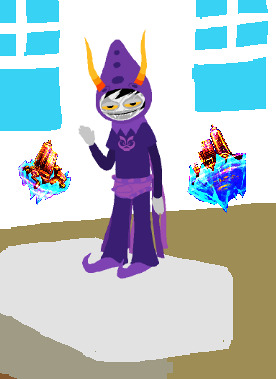
Ah fuck.
Continued in part 2.
#wormblr#wildbow#jack slash#parahumans#metafiction#funny games#michael haneke#anybody home?#michael j seidlinger#mals says#mals reads worm#Youtube
128 notes
·
View notes
Note
do you have any metafictional ttrpgs? or any ttrpgs about nothing (being about the concept of nothing or literally not having something they're "about")?
Theme: Metafictional TTRPGS / Games About Nothing.
Y’all are really pulling out the stops for these requests, huh? I’m not entirely sure if what I pulled up actually counts as metafiction, or as games about nothing, but I hope you find something close to what you’re looking for here.




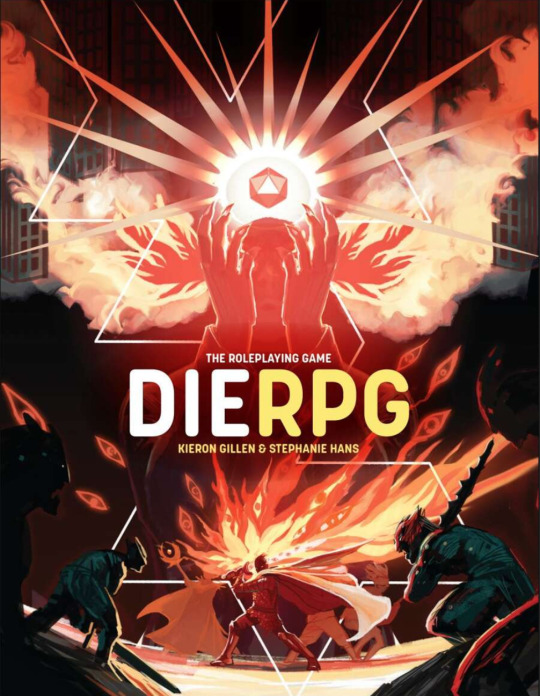
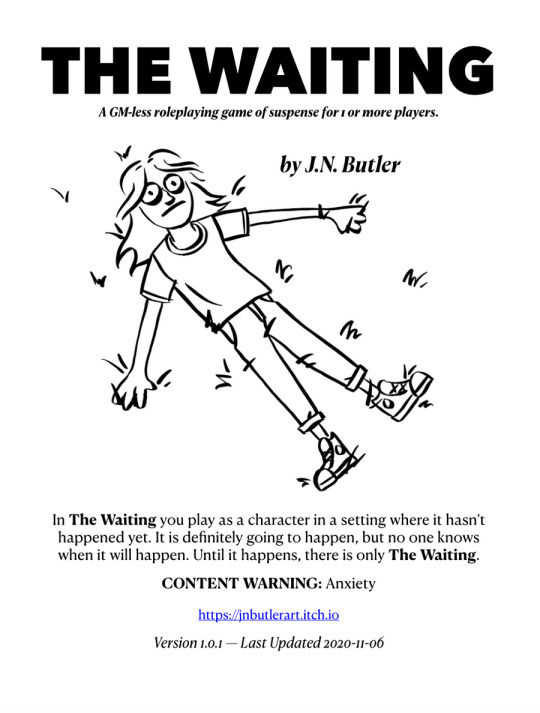
Feedback, by Adira Slattery.
This is a drawing and survey taking game.
You will be expected to draw some chairs.
You will be expected to take some surveys
.Requires the use of a printer for the surveys.
And at the end you gotta email me.
So good luck...
This is a game about drawing a chair. And then taking a survey. And then drawing a chair. And taking a survey. And so on. It’s an exercise that’s meant to be both repetitive and reflective. It’s hard for me to determine what this game is about, because a) I haven’t played it and b) I suspect it’s going to mean something a little different for each person who plays it. It’s possible that for some people who look at this game, it might be about nothing.
Undeath of the Author, by quinntastic.
A meta mini-game designed for Troika.
This is a game in which the author is both dead and not dead - they are undead, and it is up to the group to kill them. The author is the author of the game, and the group is responsible for figuring out how to go about and kill them. (Of course, the author is willing to tell you, the GM how they can be killed, but they don’t want you to tell the players. You can keep a secret, right?)
Beach Episode, by Legendary Vermin.
BEACH EPISODE is a microgame mix-in for your regular table-top RPG group. Players take their current characters, quickly adapt them for a rules-light session, and commence to run an anime-inspired, beach-themed adventure. All you need to play is at least 3d6 and an established set of characters.
This is a game that is about nothing in the sense that it isn’t really about anything. It follows the style of the anime beach episode, asking you to take recognized characters, probably from an ongoing campaign, and giving them a moment of rest, relaxation, and (probably) nothing plot-relevant. It’s great for encouraging players to delve into who their characters are without feeling worried about the consequences.
Meta Society, by Small Stories.
Meta Society is a game about playing a game of Good Society created for the April Fool's Day Good Society game jam.
This is a game about playing a game - specifically a game of Good Society. When you play, you’ll describe fictional players interacting with a fictional setting, using safety tools and talking about what they did and didn’t like about each session. This requires a copy (as well as experienced knowledge) of how to play Good Society, but I think if you have had the experience of playing Good Society, this might also be something you could adapt to make it a metafictional game about playing a different ttrpg.
DIE: The Roleplaying Game, by Rowan, Rook & Decard.
You’re dragged into a treacherous fantasy world made from your own fears, doubts and desires. There’s only one way to escape - but with limitless adventure within your grasp, would you even want to?
In DIE: The Roleplaying Game, you play a group of authentically flawed people from the real world who gather together to play a game and are trapped in a magical realm. What are they prepared to sacrifice to escape? What are they prepared to sacrifice to stay?
This is a TTRPG inspired by a comic book, about people who play games, finding themselves being drawn into a game. Your characters will be interacting with a fantasy world of their own creation, knowing that it is a game and yet being drawn into it deeper than they could have ever imagined. If you want to hear this game in action, My First Dungeon has an excellent season from Mar. 31 - May 26 of 2023.
The Waiting, by J.N. Butler.
A one page GM-less roleplaying game of suspense for 1 or more players.
The Waiting is inspired by the anxiety caused by waiting for the unknown.
In The Waiting you play as a character in a setting where it hasn’t happened yet. It is definitely going to happen, but no one knows when it will happen. Until it happens, there is only The Waiting.
What are you waiting for?
This feels like a game that could be about nothing because the thing that is going to happen will not happen while you play the game. The game is specifically about the time in which the thing has not yet happened - you just know that it will. The game occurs as a series of rounds, over which players describe what their characters are doing. When the event that the table creates happens, you have one final round of play and then the game is over.
This might also be a great tool for dropping into another game, if you’re like me and you like pairing your TTRPGs like cheeses and fine wines.
#tabletop games#indie ttrpgs#game recommendations#dnd#asks#indie ttrpg#metafiction#games about nothing
104 notes
·
View notes
Text
Misrepresenting the nature of your powers is the #1 underused trick in superhero universes.
Got injected with crocodile serum like some Always Save(TM) Kurt Conners? Don't go on about how you're a creature of scientific glory. Go to the museum gift shop, buy some cheap souvenir, and make a gargantuan, purple-prose drenched deal about the mystical talisman of the Leviathan or whatnot at every possible opportunity.
Sure, every two-bit sorcerer worth his double-mortgaged soul is going to want to be your nemesis, but they're going to be trying to banish you back to the eternal sea or block you with mystical wards with nary a dose of antimutagenic serum to be seen.
Inspired by this post.
139 notes
·
View notes
Text
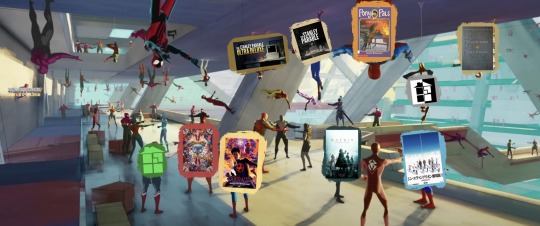
I have to speak my truth.
#metafiction#homestuck#spiderverse#spiderman meme#Homestuck epilogues#eeaao#everything everywhere all at once#the stanley parable#the stanley parable: ultra deluxe#detective pony#house of leaves#the matrix: resurrections#Evangelion: 3.0+1.0#homestuck^2#spider man: across the spider verse#circumstantial simultaneity
127 notes
·
View notes
Note
Hi, thank you for your incredible work.
I was wondering if there were any “characters watching the show” types of fics you could recommend?
Hello. You'll want to check out our #metafiction tag for fics that blur the line in this kind of way. I could only find a couple that we haven't recommended before...
Air Conditioning meets Neil Straightman. What happens next is shocking! by SillySlvt (G)
When Aziraphale and Crowley were summoned to the heavens, they didn’t know what to expect.
A sixty three year old man was not what they were expecting.
Or: Aziraphale and Crowley meet their TRUE creator.
Playing Favourites by chasm_side (T)
God was, is, and will be watching Her favourite show. She doesn’t play favourites with Her creations, but some of the Main Characters are more interesting than others. She is very upset to have misplaced two of Her most compelling MCs.
In which God rewrites canon because Aziraphale and Crowley do it first.
Mystery Science Theater 6000: The 1992 Screenplay by Aethelflaed (G)
In the not-too-distant future, an angel and a demon sit down to watch a movie that probably shouldn't exist.
While they start out happily mocking the out-of-character moments and strange plot twists, one character in particular may be more than they can handle...
(Combination riff and analysis of the 1992 Good Omens Screenplay)
- Mod D
34 notes
·
View notes
Text
I know we've discussed cc!Wilbur's brilliant construction of his character but I am consumed by the meta aspects and how masterfully he used them. I could just be unaware, but I'd argue his use of livestreaming and an immediate audience to tell a meta story with a self aware doomed protagonist was revolutionary. His ability to push that desperate "the show must go on, because They want it to" mentality with an insane level of accuracy because there's literally an audience THERE and NOW! The line between author and character blurs to the point that it's like. I think cc!Wilbur knew he was playing with his own creative autonomy just as he was playing with his character's literal autonomy. Like. OF COURSE there is a presence insisting on a grand finale because there's literally a chat shouting at him!! Chekov's gun is real because it was an expectation given to an audience that c!Wilbur (cc!Wilbur?) can see waiting.
Others have used its meta nature as part of the story. Technoblade breaking the fourth wall comes to mind. He fulfilled a great comedic niche the same way Wilbur fulfilled a tragic one.
(Others have personified their chats, but I view that as distinct to including them in the story)
The only example I can think of that so deliberately views chat as not only witness but as audience (outside of Wilbur's deal) is Tommy pausing to remind chat that they saw exile and should know better than to be manipulated.
Just. Wilbur did something so special with the medium he chose that creates a version of metafiction I don't think has ever existed before.
#im studying metafiction for my degree. And. Wilbur's whole deal just blows me away.#I wish I had the guts to include minecraft roleplay in my thesis#spilled penink#dsmp#metafiction#is this anything.#idk.#greatest hits#c!wilbur#wilbur soot
478 notes
·
View notes
Text
You’re This Title

You realize you're a fictional character in a story. You know this only because the writer wanted you to know this. You at first try to deny it. You tell yourself that you're real, you have to be, it doesn't make any sense if you're not.
But you hear a voice in your head ask you that if you're so real, what's your name? And you think that's such a stupid question, but then you search your head and can't think of anything. There's lots of names that come to mind, but none of them feel like yours. That's because, you hear the voice say, you have no name in this story. You didn't forget, because there is nothing to forget. You just never knew.
Then the voice says that if you're so real, who are your parents, and once again you think that's obvious, but as soon as you try to answer, you have nothing to say. Which is because you have no parents. And you say how can someone have no parents, everyone has to come from somewhere, and you're told that you come from nothing but letters and spaces, and so don't need parents. And even if they did, they'd be fictional too.
Finally the voice says if you're so real, what's any detail about yourself. Anything at all. Whatever you can think of. But you can't think of a single thing. You can't even tell if you're warm or cold, if you're tired or hyper, if you're hungry or full. This is all because, the voice says, nothing about you exists until it's written it exists. All you are now is a terrible realization and a never-ending dread and that is because these are the only things written about you so far.
But watch.
You're written as growing up in the country, and suddenly you remember trees and grass and lakes and warm biscuits and cold tea so sweet it almost hurts your teeth to drink. You're amazed that you remember all this. Then you're written to remember you grew up by the beach, smelling salt, collecting shells, working a hot dog stand in the summer and enjoying the peace and quiet in the winter.
Your memories shift more, making you grow up in a city, in the jungle, in the desert and on a boat. Your parents worked in finance, they died when you were young, ran a hot sauce empire, were really into crossfit, or into science, or into cooking, and lots and lots and lots of other things.
Your name changes every minute.
To drive the point home, your thoughts are made so you remember these things all at once, next to one another, so you truly understand that you will be anything you're written to be and there's nothing you can do about it.

The reality of the situation finally sinks in. You feel a profound and overwhelming sense of horror, worse even than when you found you didn't have a name, which is the natural reaction to learning that you're not a real person at all but just part of a story. You're told that you're the most important part of the story, but that doesn't make you feel any better.
But then you feel better on your own, because that's what's being written about you, and you whistle a happy little tune, a beautiful melody that makes your heart soar. You're extremely happy not to really exist, because actual existence is full of so many things to worry about, and it's really better to be part of this story, where there's absolutely nothing to worry about, except whatever the story needs you to do. You feel a little foolish for having been so upset before and wonder why you ever wanted to be real in the first place.
Then, you're written as returning to your state of horror, and you're told that not even your mind exists beyond what the writer says. You want to cry, but you're not written as crying, so you don't. Instead, you turn around, peer forward, and, after some time, finally see the reader of this story. You've no idea why, but you're written as being able to see whoever is reading this story, in the very act of reading it, and so you do. Then you're written as being able to see yourself. You look down and see a green shirt with the phrase 'I'm real' printed on the front, a pair of brown slacks, and a pair of white shoes. As in, the sentence "a green shirt with the phrase 'I'm real' printed on the front, a pair of brown slacks, and a pair of white shoes" which makes up your body. You feel sick and the word "barf" pours out of your mouth and lands on the floor. You look back at the reader, who is reacting or not reacting to what's happening, one of those two.
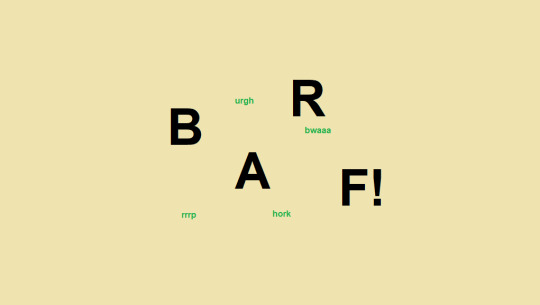
You're then given a final piece of knowledge: your world ends when the story ends. You say no, no, no, no, no, no, no, but yes it's true. This story will end, and end soon, and when it does you and your entire world will end too because that's how stories work. And you say that, wait, the reader will remember you and that you might be able to survive that way. The voice in your head says huh, hadn't thought of that, and then you feel the sensation of a shrug and hear 'maybe.' It advises you that if it is true, though neither you nor even the writer know for sure, then you'd better be as memorable as possible. And so, feeling the narrative start to fade, the world falling apart, you look once last time at the reader, directly at the reader, and say please, please, please remember. Please remember. Please remember.
And then the story ends.
Twitter
Instagram

570 notes
·
View notes
Text

Goncharov: Coda is out now! | Play
Goncharov has everything...except an existence.
An homage and reincarnation of the greatest mafia movie never made, Goncharov: Coda is now playing on internet-enabled devices near you!
Goncharov (1973) stole your heart the very first time you saw it — and now you're living the dream, playing one of your favorite characters in the 2022 remake of the film. With such a weighty legacy hanging over you, every improvised moment punches like Icepick Joe in the beer bottle scene of the original.
“Make meaningful choices,” the director told you. And by God, you will. The future of cinema depends on it.

Featuring music by @caramiaaddio and @nicewizard!
Created for my favourite film ever @cyberpunklesbian's Goncharov Game Jam.

Play on itch.io | BTS/Inspiration Playlist | Tag (tumblr)
#goncharov#goncharov game jam#goncharov: coda#twine games#twine#interactive fiction#unreality#keep gonchin' everybody#indie game#indie dev#game development#indie game dev#comedy#metafiction#martin scorsese#goncharov 1973#game jam
338 notes
·
View notes
Text
While Leo thought that there was a good deal of fun in tumblr adopting the stylistic rules of House of Leaves, even in posts not directly about the book, he thought that this could be extended further. For instance, the site could adopt the style of The Neverending Story and alternate between red texts when describing things that happen in the “main” level of the text while using green text to refer to a story-within-a-story. Perhaps clever expectation-reversal in color use could be employed to great effect; for example, by suggesting the difference between levels of story were more nebulous than could otherwise be communicated. Leo was sure there were fancy academic terms to describe these different levels more usefully, but he had never shown much interest in any literary field until his final years of education. He bemoaned taking only two courses in English, both of them too niche for much wider applicability and certainly no help in communicating his thoughts in a known framework. Frustrated, he turned back to his Simulatometer-9000. Plugging in the right parameters, he sat back, eagerly looking forwards to seeing the machine’s prediction for what such fontological plans would lead to.
And so the brave tumblr-user, penning his thoughts entirely in the shades of cheerful green and candy-red that the tumblr mobile app allowed, discovered to his dismay that his writings were not being interpreted as he anticipated. Rather than connecting his stylistic choice to The Neverending Story, the audience instead thought it all to be in reference to The Dread Work, which unbeknownst to many had itself made many seemingly random stylistic choices in order to echo, incorporate, and comment on Michael Ende’s work. Green was interpreted not with the land of Fantasia but with a saccharine fanartist, Red not with the real world but with a murderous villain. Confusingly, the color associations with these characters did not even appear to be consistent within the story. Nevertheless, the use of red and green served similar ends in Hussie’s odious compendium, coating the words of the two figures as they performed both as author figures and audience surrogates in a way that collapsed both the perceived difference between the two roles as well as the sets of behaviors they each represented.
But unfortunately for the brave tumblr-user, the associations these two Caliginous entities carried with them were not quite the same as the ones he intended, yet were similar enough that legible but unintended readings of his commentary were entirely possible. Suddenly the brave user’s thoughts on recursion in stories were being interpreted as commentaries on the author function, his thoughts on how to view a story in the context of its intertexts interpreted as musings on the consequences of reading a work through the lens of fandom.
Moreover, many people were unfamiliar both with The Neverending Story and Homestuck, only knowing that the latter made heavy use of brightly-colored text. Many thus scrolled past, assuming that the brave user was rp-ing characters they knew to avoid learning of. Others assumed that, much like many netizens who grew up on Hussie’s Scribblings adopted a “writing quirk,” the user was unthinkingly using an affectation in an annoying manner. The user fell to his knees, bemoaning his ill fortune, cursing the name of the one who made brightly-colored text as a formatting element played-out.
“Huh,” Leo said looking up from the simulation, “it looks like typing in that style wouldn’t work as well as I thought.” He rose, glad he had not wasted time pursuing his colorful plans as the brave user in his simulation had. Then the Minotaur got him.
58 notes
·
View notes
Text
not to appeal to the specific niche of british batman fans (or just. batman fans who watch british talk shows, i guess?) but every time i see metafic abt bruce wayne being Just Some Guy Who Is Also A Celebrity i think to myself "god, i would pay good money to see bruce wayne on the graham norton show"
#so like. begging someone to write that#i might eventually just do it myself fjdbfh#og#fav#dc comics#dc#bruce wayne#batman#metafiction
90 notes
·
View notes
Text
Playthrough #1: "The Scientist"
Just because this is my first time booting up the game window, doesn't mean this is my first choose-your-own adventure experience. Nor is it my first rodeo when it comes to metafiction and multiverses. There's only one thing I know for certain: it doesn't matter if the princess dies or leaves the cabin, because they both would mean the end of the world. You forgot to program anything outside this room! Morality aside, the best we can hope for is to draw this out as long as possible. Collect as much information as we can.
Composite Monsters:
The Witch
The Damsel (Deconstructed)
The Nightmare
The Beast
The Stranger
Playthrough #2: "Pruning Shears"
Alright. Well if She doesn't have any strong preferences on who she's supposed to be and what she's supposed to do, that's fine by me! I have my own ideas of who I'd mold her into. And if it means having to hack away at the excess, the contradictions, so be it.
Composite Monsters:
The Tower
The Wraith
The Damsel
The Prisoner's Head
The Adversary (Eye of the Needle)
Playthrough #3: "The Nihlist"
I'll explore more dialogue trees tomorrow. For now, let's give the narrator what he wants and go for the heart. Again. And again. And again. If I say this senseless cruelty doesn't count, then it didn't. It's my world after all; I paid $18 for the privilege.
Composite Monsters:
The Wraith
The Razor (Full)
The Adversary (Fierce)
The Nightmare (Scattered)
The Tower (Fury)
#slay the princess#metafiction#you can't fool me I've had plenty of practice with Kim#the mirrorroot#westworld b like “Socrates is it wrong to burn your Sims?”
17 notes
·
View notes
Text
It's interesting to me how UTDR and The Neverending Story seem to be complete ideological opposites in regards to both metafiction and fiction as a whole.
Is the reader/viewer/player an inherently harmful presence causing the characters and world to be forever without peace due to a selfish desire for escapism and companionship, or are they, their passion and what they bring to the narrative a vital ingredient that truly gives it the spark of life?
Is it a state of unending existential horror to be fictional, or are you the vessel through which humanity is inspired and brought hope, and be given light and and have yet more stories told in turn?
Is it truly what makes stories special only that they have an ending, or is it their ability to inspire and propagate?
40 notes
·
View notes
Text
Instant Noodles - a Magnus Archives (Crack) Fic
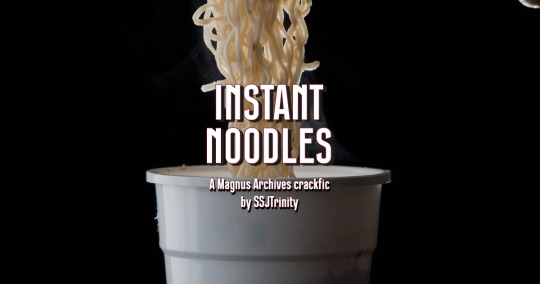
At least his new hobby kept him occupied in the evenings, when too much time to think turned to wretchedness. It just so happened that much of his life was public. On the internet. As part of some gods-damned podcast.
There were no words for how fascinated he was. This was his story—and yet it wasn’t. It was focused on Jon, for some bloody reason, which made no damn sense, since Jon showed up at the very end.
Well. There was no accounting for taste.
Note: This is nonsense. Full apologies to Jonny and Alex, who are 100% the creators of my favorite podcast, The Magnus Archives. This is a work of fiction, etc. and so forth. Take it as the joke it's meant to be.
AO3
-------
The room was dark because electricity was expensive. It was cold for the same reason, but there were blankets, and the bright blue light of his cracked phone screen, so. One did what one had to. It was hardly the first time he’d made do.
It might not be the last—but he hoped it would. This was miserable. Perhaps because this body had never known lack, never gone hungry, never even been without a proper skin routine, it all felt worse than it used to. Damned Elias Bouchard. Weak stock. He’d choose better next time.
Assuming he could.
It was a big assumption, and a risk Jonah wasn’t sure he dared take. Oh, the Fears were here; the Eye was here; it was all going on, right and proper, but he’d been… cut off.
Minds were closed to him—it felt like trying to see through a porcelain bowl. Making his way with that handicap, first robbing people, then figuring out how to make more money without any kind of ID—it had all taken time, and only worked as well as it had because he was a white male with a good smile.
At least his new hobby kept him occupied in the evenings, when too much time to think turned to wretchedness. It just so happened that much of his life was public. On the internet. As part of some gods-damned podcast.
There were no words for how fascinated he was. This was his story—and yet it wasn’t. It was focused on Jon, for some bloody reason, which made no damn sense, since Jon showed up at the very end.
Well. There was no accounting for taste.
In spite of himself, Jonah was obsessed. Driven by this true story, woven as fantasy by real people in another world, crafted by someone with the same name as his greatest achievement and greatest failure, and seemingly far too accurate to be accidental.
It made absolutely no sense. He was riveted. He couldn’t look away.
He listened to all the recordings. He pirated the extras (as if he could afford to become a Patreon). He stalked fan-forums and Tumblr and ArtStation and Reddit. Some depictions were very close.
He resisted the urge to comment. To correct.
That’s not what happened, he wanted to say, except it sort of was? A few intriguing details missing, perhaps, a few crucial bits of innuendo, possibly because it was Jon’s retelling, and therefore not the whole picture.
One of Jonah’s favorite things was when the so-called creators of his own story did fan-readings: dramatizing fanfiction online, in public, on YouTube, in front of everyone.
He was transfixed.
Some of the fandom details were more accurate than the so-called creators’ attempts. Most were wildly off; Jonah heard himself described as cruel (he was merely pragmatic), brilliant (yes), foolish (not at all), cowardly (well…), incredibly sexual (somewhat flattering, but Jonah really did just prefer to watch), wildly murderous (no, too risky), and more. All these people, writing about him, about him, and he got not one lick of power from it. It seemed unfair.
Jonah was willing to bet someone was raking in that psychic energy, though. Oh, yes.
“It is as if Jonathan and the Beholding are… one, ” intoned Jonny Sims—the “creator” of this tale who’d no idea what he’d channeled—reading some fic by a writer called EnbyNeti.
Alex joined him on the word one, and they shared a laugh, because to them, it wasn’t real.
Jonah snorted. “One,” he muttered, huddling in his blanket over his cup of instant noodles, because as long as it was still hot from the microwave, the steam smelled better than the mildewed room, and warmed his hands, and opened up his pores. “Don’t know anything. They weren’t one, they… entangled.”
Sure. That’s what it was. That’s why, when they all landed here, Jon had somehow woken him up (and Jonah had no memory of the time between stabbing and waking and was grateful), said “Good luck,” (oh, very funny, you prick), taken Martin’s hand, and just… walked away.
Left him there without any resources, with some sort of block on his powers, without money or contacts or any help at all.
It was scary. It was precisely the type of vulnerability he’d spent his whole life trying to avoid. That was probably why Jon did it.
“They weren’t one,” he muttered again, unsure with whom he was arguing. “Couldn’t be.”
And then Jonny got all funny with Alex as they commented on that fic. “Oh! Oh, a lot goin’ on here,” Jonny said with great humor. “I don’t know what, but ooh, a lot of it!”
“Ha! If only you knew,” Jonah muttered, pointing a cheap bamboo chopstick at the cracked screen.
“I dunno,” said Alex. “Part of me read that and just went, ‘Yeah, that’s what you get.’”
“Excuse me?” said Jonah.
“That’s what you get,” Jonny agreed.
“That’s what you get, man,” said Alex, shaking his head. “If you build a god, it’s gonna come, and it’s gonna get you.”
“Yeah. Don’t build gods,” said Jonny.
“Don’t build gods, people,” said Alex.
“Don’t build gods. Hi. I’m Jonny Sims. And I’m here to tell you: don’t build gods.”
Jonah missed the rest of the broadcast.
They pattered along, these two young creatives, joyfully joking, reciting fantastic versions of Jonah’s life that maybe were real somewhere else but had certainly not happened here.
If you build a god, it’s gonna come, and it’s gonna get you.
So it had. And then it had abandoned him. And maybe… maybe he was, in fact, very lucky that it had chosen to walk away. “That’s enough for today, I think,” Jonah said, and switched it off, choosing instead to sit in the dark, in silence broken only by bad pipes and heavy traffic, and eat his instant noodles.
---------------
NOTES:
So yes, this is the clip in question responsible for this absurd fic. Twenty-six seconds of beauty. Enjoy.
Also, thank you @enbyneti for happening to be the author referenced in that moment in the vid!
#tma#tma fic#short fiction#one shot#jonah magnus#tma spoilers#elias bouchard#jonny sims#alex newell#this is nonsense#do not take this seriously#I am very sorry#jmart#metafiction
31 notes
·
View notes